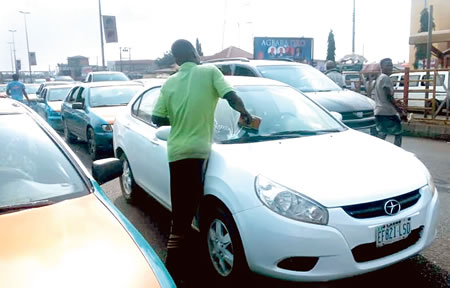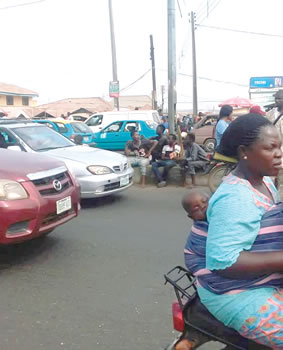In almost every street of most Nigerian towns and cities, beggars are a common sight while their population keeps growing geometrically every other day with mentally and physically disabled individuals including street urchins engaging in street begging.
5 sober prophetic predictions for 2019
In Akure, the Ondo State capital, street begging has evolved in another dimension with the presence of some underage children from the northern parts of the country who graduated from street begging to washing windscreen of cars in traffic and making a living out of this.
The business of washing windshields of vehicles in traffic has become quite unusual with motorists beginning to worry. It is common to find able bodied young individuals set up petty trading business with the money accrued from the wind shield washing.
The number of these able bodied however keep growing with school age children turning the only functioning traffic light in the Ondo State capital, along the popular Oba-Adesida road, to a source of livelihood while begging for money from motorists. The irony of it all is that the boys never for once try to seek the consent of the motorists before starting to wash the windscreen. Initially, only young boys from the northern part of country engaged in this washing business but Nigerian Tribune noticed that some young boys from other ethnic extractions have joined in this.
Nigerian Tribune got to the popular junction around 7:30 am where these boys usually converge every morning and spoke with one of the boys. 17-year-old Ahmed Aliyu, from Kano, Kano State, disclosed that he left home to make ends meet after humiliation from his father who tagged him “lazy bone” after dropping out of school at age 10. He said he joined a truck heading to Lagos without his parents’ knowledge but had to stop in Akure, after meeting some young boys also from Kano who informed him that Akure was peaceful.
“I am 17 years old from a polygamous home. I dropped out of school in primary four. My father always accused me of being jobless and threatened to send me packing from his house. One day, I informed my mother about my journey, even though she did not approve. I was determined to leave and in January last year, I joined a travelling truck without even knowing where it was headed.
“I slept in different shops for over a month in Akure before I saw people doing this job. I discussed with them and later joined them. I do not know anybody here, but I have rented a room apartment around Sabo area now from what I get here. As soon as I make enough money, I will go home to see my parents,” he said.
Also, another 10 year old boy, Moshood Alinko who claimed to be from Sokoto State, said he is the first born of his mother. He said they had to leave home because of his father’s uncaring attitude considering the harem of wives that his father kept.
According to him, he had to get into the business so as to help his mother and siblings financially. He explained that his younger sister, Azezat is at home down with malaria fever and his mother was in need to get drugs worth N3,000 for her treatment.
“My mother persuaded me to resume work early so as to get some money for the drugs. My mother has only N1,000 and my sister is seriously sick. I need to help her, because my father is far away in Sokoto and we need to take care of her. We came to Akure in 2013, but I started this job eight months ago to help my mother. I normally make between N1,000 and N1,500 daily, if the market is good, but we have become so many here now and the business is no longer becoming lucrative and attractive like when I started.
“Whenever my mother is financially buoyant, I will quit the job, because it is dangerous to continue to stay in traffic under rain and shine. I want to get back to school like my mates,” he stated.
For 16-years-old Adamu Isiyaku, the time is ripe to quit the job and think of doing better. He said “at times, we clean windscreens and motorists will not give us anything. This set of people usually promise to come back, but they won’t, though some of them are very nice to us; they sometimes give us more than expected.”
When advised to learn one vocation or trade, he asked “if you will pay for it, or who will pay for it? I came to this town from Kano without the consent of my parents. I ran away from home because I was left to fend for myself.”
A trader along the area, Joseph Ndubusi, said the young boys should be flushed out of the streets noting that “these children will grow up soon to become untrained and un-trainable young men and become burden to the society. We should look into the future and stop breeding future criminals. We should stop endangering the nation’s security.”
Ndubisi said the boys could turn violent if no one attends to their needs. He called on government and other stakeholders to contribute positively to their lives in order to tame the menace before it goes beyond control, urging them to extend their humanitarian service to them.
A food vendor, Mrs Ajike Ayeni, also advocated the removal of the children from the streets. She said most of them patronise her food canteen and sometimes eat on credit but saluted their faithfulness in coming back to pay whenever they had money.
She likened the development to the Almajari situation in the northern part of the country saying “If we fail to act fast enough, if we don’t fashion out policies to tackle the problem of leaving our kids to work on the streets at this tender age, we will all pay dearly. No part of Nigeria is immune from the imminent danger.”
Our correspondent however visited, the state Ministry of Women Affairs and Social Development, where an official of the ministry who spoke under the condition of anonymity said by law, underage children ought to be in school and under parental care.
He said the ministry noticed the activities of these underage last year and planned to take them off the streets but said the exit of the commissioner in charge of the ministry delayed the exercise, saying some of the boys could be rehabilitated.
“A lot of things do happen causing less than 18 years old to be on the streets. Some are orphans, some were abandoned, some left home on their own, in addition to other reasons, and they just end up being on the streets.
“As they are they may be prone to vices, for the fact that they are on the streets. They can easily be influenced by people with shady characters. That portends serious danger to the society.”
He said the ministry sometimes moves round periodically to mop the streets. He said that any under age children they see will be taken to the Correctional Home under the ministry along Ondo road in Akure .
“We have a remand home for people like that, including those who have been reported at home for trouble making or have engaged in crimes. We cannot take them to prison because they are under aged, but from the court, they will give the custody of that person to the ministry.
“There should be permanent measures by all of us, not the government alone. Religious bodies, nongovernmental organizations and philanthropists must collaborate to curb the menace. Most of these things are caused by the breakdown of family values and structures. If a family is intact, if the structure is strong, you will rarely see anybody of that age on the streets.”
He advised parents to only have the children they can take care of. “If you are not ready to take care of a child, do not bother to bring such child to the world, because parenting goes beyond just giving birth to a child. It is a whole lot of work. Parents must try as much as possible to live up to their responsibilities. These include children’s well-being in terms of education, health, mental and spiritual growth,” he advised.







